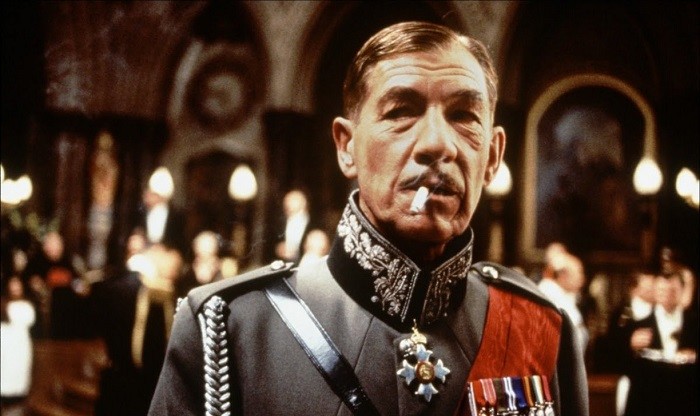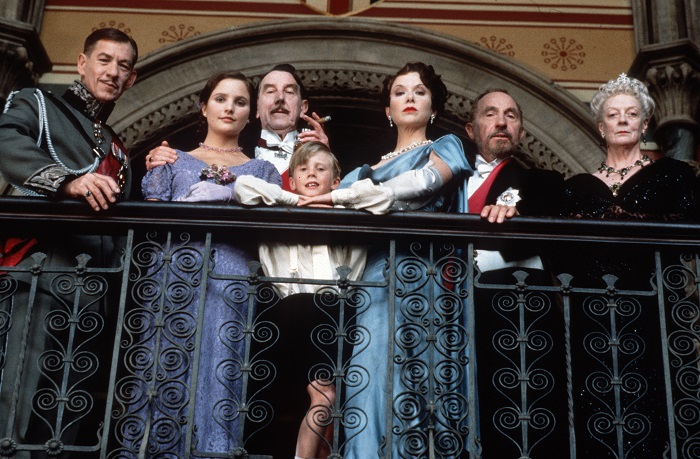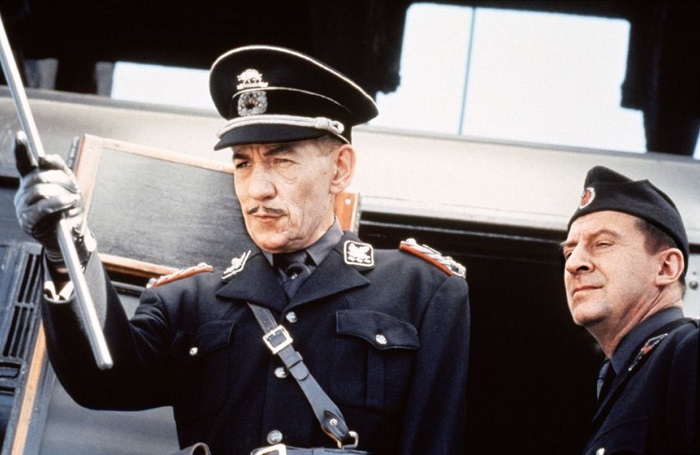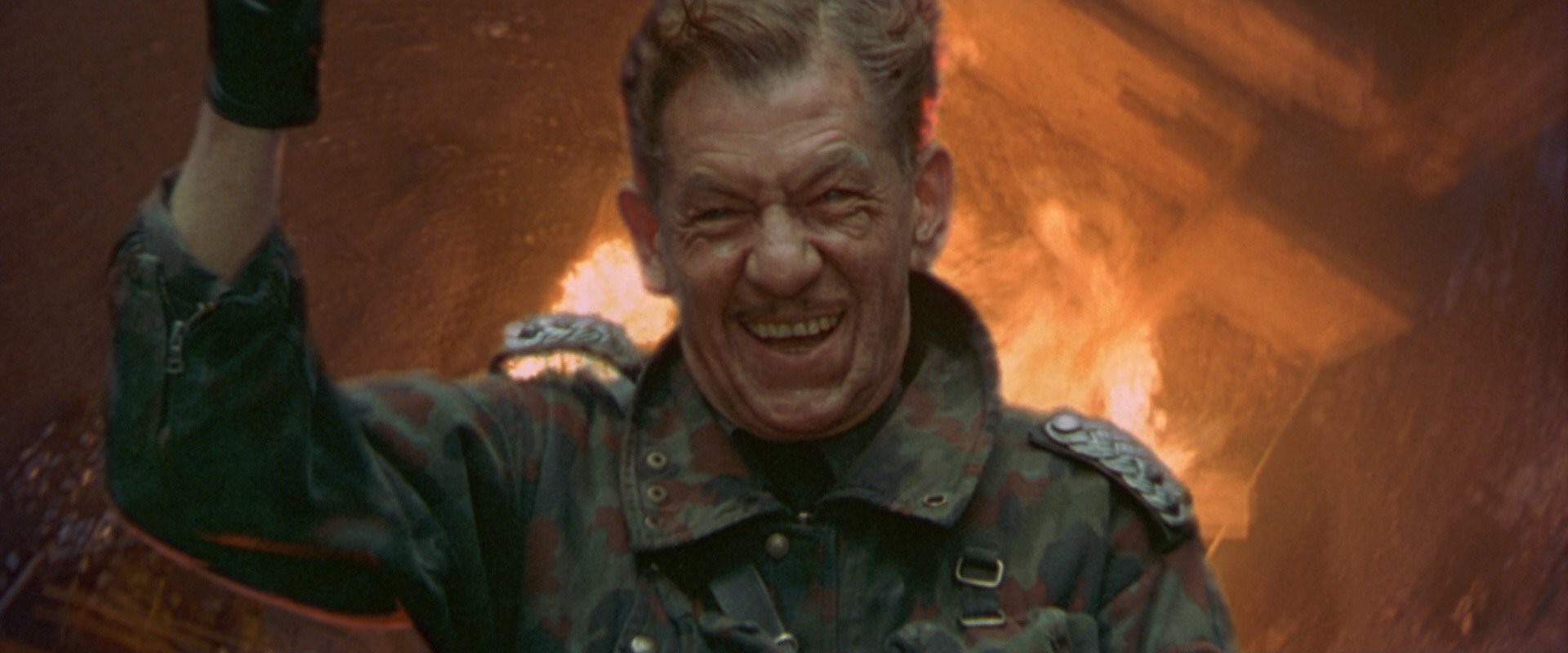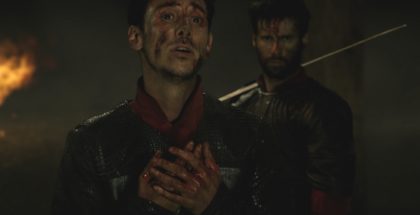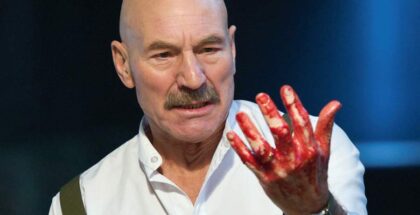Interview: Richard Loncraine looks back at Richard III
David Farnor | On 25, Apr 2016
On Thursday 28th April, the BFI is hosting a screening of Richard III, followed by an on-stage discussion between Ian McKellen and director Richard Loncraine, beamed live into cinemas around the country.
We catch up with Loncraine ahead of the event to talk Shakespeare, Sir Ian and shooting one of cinema’s boldest adaptations of the Bard’s work. 21 years after the movie was first released, Loncraine’s Richard III remains among a small group of movies that dare to do something different with Shakespeare – in this case, throw in everything from Nazis and tanks to Robert Downey Jr. and trips to the bathroom.
“It was a difficult film, but it was a happy film,” recalls the director. It turns out, in fact, that it almost didn’t happen at all – three weeks into production, they ran out of money.
“We went bankrupt halfway through!” says Loncraine. “And the film collapsed the day we started production because the leading lady walked out, so it was pretty traumatic!”
It’s an unconventional start to an unconventional movie, which culminates in an explosive showdown around Bankside Power Station, before it became the Tate Modern.
“I remember the last sequence, I was laying detonators with the effects men because we had run out of time,” reveals Richard, with an audible smile, “so I was talking to actors while laying explosive charges. Not something they’re very keen on, normally!”
“It was probably the reason we went bust, because I was doing mad things.”
It’s one of many striking moments, mostly thanks to Loncraine’s use of location and imagery; Battersea and Brighton Pavilion merge with Third Reich-style flags and uniforms and Soviet tanks, creating a recognisable but eerily alien world in which Richard has risen to power.
“I guess I spent my life shooting things and objects and designing stuff, I was into graphic design and sculpture and stuff, so I arrogantly think I know about visual taste,” he comments. “And I always thought you have to be careful not to overpower a performance with a location, so you know, when you find a location for a movie, you have to back off, because you don’t want the audience going ‘Ooo, look at that amazing building, Joan!’ No, listen to what the actors are saying. Don’t look at the bloody building.
“[Richard III was] the first and only time in my life where I couldn’t upstage Shakespeare – it didn’t matter what I threw at him, he always trumped us. So it was great fun, because I realised that quite early on and kept coming up with more and more madder ideas!”
We talk about the lengths Loncraine and his team had to go just to shoot one prison scene featuring Nigel Hawthorne.
“That was the base of a bombed-out gasometer in Richmond and the actual bit that goes up and down sits in water – the water is the seal – and the centre of it, the big concrete middle, I don’t know what that’s for, but it’s there, we had to be lowered into that via crane. All of the crew had to be lowered in in a basket and thought I was mad!”
He was “really pleased” with the result, he continues, then pauses. “It was probably the reason we went bust, because I was doing mad things.”
Loncraine’s cinematic eye, though, is exactly what Richard III needed to get away from its stage origins – the production was based on the National Theatre play that had just starred Ian McKellen, to great acclaim.
“I never saw the production, but I believe it was very good,” says Loncraine. “Richard Eyre directed it, a very talented man.”
He came on board the project a year before they shot the film, with no theatre background whatsoever.
“Shakespeare was taught really badly for me at school – I had an expensive, but rather bad, education – and I came out of school thinking Shakespeare was for other people,” he admits.
At the time, he was directing ads – “I was doing quite well, very well, to be honest” – and was comfortable plying his trade.
“I didn’t really want to do little movies for nothing, I was enjoying doing commercials,” he continues. “I was foolish, of course, I wish had not been earning as much money, I would’ve loved to have done more movies, I regret that, it was my bad decision, but I get this script and I’m driving back from my home in France with my wife and it’s pouring with rain, and she says ‘Why don’t you read one of these scripts?’ and I said ‘Oh, Richard III. I don’t like Shakespeare. It’s not for me.’
“So I picked up this script, not very interested and I started reading it and then I saw the line ‘A horse, a horse, my kingdom for a horse’ but not on a horse, but in a jeep with the wheels spinning and I thought, ‘That’s a clever idea, Mr. McKellen’. So I read on and probably went to the front and started again. It wasn’t a script that I was in love with but I thought it was exciting and interesting enough… so I said could I meet Ian and he said yes.”
Richard went along to Ian’s house on the Thames and delivered the blunt truth.
“I said ‘It’s alright, it’s not that good’ and he said ‘Tell me what to do’. Rather than show me the door, like most actors of his star quality, he’s a wonderfully humble man, and he said ‘Tell me how to fix it’.”
“It was very unsuccessful.”
That turned out to be the start of a long-term friendship that continues today – although Richard still worries that he “hopefully wasn’t rude to him” about the screenplay. They came up with an agreement: Loncraine would handle the imagery, McKellen the text and, a year later, as Richard puts it: “We made the bloody thing.”
The result was a version of Richard III that took Shakespeare’s second longest play and compressed it into an hour and 40 minutes – it’s a thrilling, gripping ride that feels recognisably Shakespearean yet completely unique.
It takes some chutzpah to do that – “You have to be pretty confident, or you have to appear to be confident, to be a director, even if you’re not,” jokes Richard – but did Loncraine have any inkling that they might make one of the more timeless takes on Shakespeare?
“I think everyone wants their films to have legs,” he says.
Alas, though, it wasn’t to be. The film didn’t do well financially when it was released.
“It was very unsuccessful,” remarks Richard, completely deadpan. “It was rather badly treated, if I recall, by the English critics. A bit mealy-mouthed. The Americans were very complimentary and so were the Italians. It was very big in Italy.”
The film struggled, too, in the awards race – United Artists also had Leaving Las Vegas out that year and they decided to put their money behind that instead.
“McKellen, if anyone deserved an Oscar for a performance, it was for that part,” says Richard. “We fell foul of the fact Hollywood is about business and ever it will be… you have to have a good film, but you can’t win without millions of dollars to spend on it and so Ian didn’t get a nomination.”
“I don’t mind that we didn’t win,” he adds. “I do mind that he didn’t get nominated.”
Since then, Ian McKellen has been nominated for two Oscars, including one for The Lord of the Rings: The Fellowship of the Ring. Even before he was having fun on the blockbuster circuit, though, was it hard to direct such a star in a role he had already made his own?
“There’s a lot of myth talked about directing actors, but the secret is to cast good ones and get good words for them to say,” comments Richard. “Great actors, you nudge them, you don’t direct them, really. You just encourage them. You say ‘Well, maybe a little bit, when you turned around, you didn’t quite hit the camera with your eyes, you were just a little bit…’ Things like that. Try giving someone like Ian McKellen a line reading and see how far that gets you!”
But that doesn’t mean the director isn’t one to speak his mind.
“I’ll tell you a story that I haven’t told many people,” he continues. “I didn’t see the stage production – I don’t really go the theatre, for my shame – I didn’t really want to, because I didn’t want to be influenced by someone else’s work. So I was doing my own thing. And for some reason, very close to shooting, say, three or four weeks off, I think, probably foolishly, I said I’d have a look.
“There was a lopped-off camera of the production, essentially a wide shot of the stage and I saw about 20 minutes and my heart fell, because it was not anything like the film I had in my mind. Very good, I guess, of its kind, but it wasn’t what I wanted to do. I said ‘Ian, I don’t know how to tell you this, but if that’s how you want to do it, I think you’ve got the wrong director.’ And rather than say ‘On your bike, love, I can find a director who’ll do this at the drop of a hat’, he said ‘Ok, so what am I doing wrong?’. I said ‘Well, I think you’re not doing anything wrong for theatre, but you’re doing a lot wrong for film and I just explained what little I’d learned about directing actors and what worked on camera and he, being the humble man he is, said ‘OK, I’ll have a go’ and he did it marvellously. It could’ve been really nasty, but it actually confirmed our friendship.”
The honesty paid off: from the opening scene, McKellen commands the sreen, as his Richard walks into a toilet and urinates – before turning to speak to us, practically mid-zip.
“I still think that sequence is just genius,” says Richard. “Not from me, but from him. I came up with the idea, I think, and the camera move was all worked out to do it, but there’s no directing involved there, I suspect at all.”
These days, of course, turning to the camera and making remarks is a trait many associate with Kevin Spacey in House of Cards – and Netflix’s series, a remake of the British show of the same name, isn’t shy about its debt to Shakespeare’s play. It’s not just TV that has evolved in the last 20 years, though: it’s theatre too, with Digital Theatre, NT Live and Globe Player all meaning that people around the UK can stream stage productions in cinemas or living rooms without being in the auditorium.
“Every generation will do something different with Shakespeare.”
Loncraine, who has seen some of Netflix’s House of Cards, may turn 70 in October, but he’s as bold and forward-thinking as ever.
“I think what’s great about it, about theatre and film, is it’s always changing,” he says. “It’s great that young people that push oldies like me off the top. I don’t like it when it happens, but it is going to happen and I encourage it. I just wish they didn’t push us quite as hard quite so early!”
“Hopefully I’ve got another couple of movies left,” he says, the enthusiasm still there – along with a frank sense of humour.
“Three strikes and you’re out in this business,” he observes. “I did Wimbledon, that didn’t make enough money – as much as a good job Paul Bettany did in the lead, it was written for Hugh Grant and he’s a very hard act to follow. Then I did Firewall, with Harrison Ford, not a bad movie, but you know, people were fed up with Harrison having his children kidnapped. It made $150m and cost $50m, but that’s considered a failure in Hollywood. And then I did what I consier the best film I ever made, called My One and Only, with Renee Zellwegger and Kevin Bacon… never got to see the light of day, never been shown in England. It finished in 2008 when the world collapsed financially, we couldn’t sell it and we just got a small release, but you do three films and they don’t make any money, you’re out of the business really. I’ve worked since then and I’ve been lucky that HBO have been good, but you have to make money for the system. There are many examples of filmmakers who make one incredibly successful movie and never make another, but the business will still keep hoping they will. But I still love the business and I’ve got plenty of energy.”
“I think everything has to be tried,” he adds, returning to the subject of theatre and streaming. “And I think Shakespeare’s an example of every generation will do something different with Shakespeare. And God bless ’em.”
With 175 movies under his belt in a variety of roles, would he have another stab at the Bard, if someone asked?
“Yes, I would, actually!” he responds, cheerfully. “I hoped to do something with Ian. We wanted to do The Merchant of Venice in a flooded New York in a hundred years from now. That would be a wonderful imagery one – of course, with CGI today you could do it, so yes, I’d love to.”
A futuristic, flood-ridden Merchant of Venice starring Ian McKellen? When Loncraine says it, it doesn’t sound crazy at all. The crazy thing? You wouldn’t bet against him doing it.


